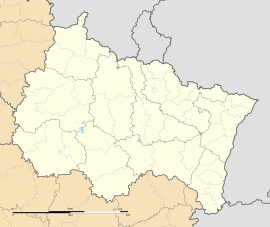Montigny-lès-Metz facts for kids
Quick facts for kids
Montigny-lès-Metz
|
||
|---|---|---|
|
||
| Country | France | |
| Region | Grand Est | |
| Department | Moselle | |
| Arrondissement | Metz-Campagne | |
| Canton | Montigny-lès-Metz | |
| Intercommunality | Metz Métropole | |
| Area
1
|
6.70 km2 (2.59 sq mi) | |
| Population
(1999)
|
23,437 | |
| • Density | 3,498.1/km2 (9,060/sq mi) | |
| Time zone | UTC+01:00 (CET) | |
| • Summer (DST) | UTC+02:00 (CEST) | |
| INSEE/Postal code |
57480 /57950
|
|
| Elevation | 165–190 m (541–623 ft) | |
| 1 French Land Register data, which excludes lakes, ponds, glaciers > 1 km2 (0.386 sq mi or 247 acres) and river estuaries. | ||
Montigny-lès-Metz is a lively city in northeast France. It sits right on the Moselle River, very close to the bigger city of Metz. People who live here are called Montigniens.
Contents
Discovering Montigny-lès-Metz
Montigny-lès-Metz is a charming place with a long history. It is part of the Moselle department in the Grand Est region of France. The city is known for its green spaces and friendly atmosphere.
What's in a Name?
The name Montigny comes from two old Latin words.
- Mons means mount, mountain, or height.
- Ignis means fire.
So, Montigny-lès-Metz can be thought of as the "fire mountain". This name likely came about because the ancient Gauls used to light fires on the nearby St Quentin mount. They did this to send signals and communicate with other villages far away. The "lès-Metz" part simply means "near Metz", showing its close connection to the larger city.
A Look Back in Time
Humans have lived in the area of Montigny-lès-Metz for a very long time. The first signs of people living here date back to the Paleolithic period. This was a time when early humans used stone tools and lived by hunting and gathering. Over thousands of years, different groups of people settled here, making it the city it is today.
Local Government and Community
Like many cities in France, Montigny-lès-Metz has its own local government. The city is led by a Mayor, who works with a team of elected officials. They make decisions about how the city is run, from schools and parks to local services. The city is also part of a larger group called Metz Métropole, which helps different towns in the area work together.
See also
 In Spanish: Montigny-lès-Metz para niños
In Spanish: Montigny-lès-Metz para niños
 | Sharif Bey |
 | Hale Woodruff |
 | Richmond Barthé |
 | Purvis Young |




